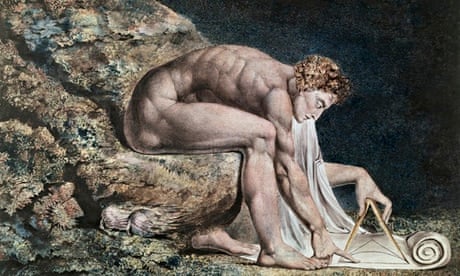William Blake’s 1795 portrait of Isaac Newton
What is modernity and when did it begin? The answer depends a lot on the nationality and specialism of the historian you ask. Italians favour the achievements of Renaissance art and humanism, as early as the 14th century; northern Europeans opt for the period when cities such as Amsterdam, Paris and London rose to economic and cultural prominence, from the early 16th through to the 18th centuries; some historians of Germany would go as late as 1900. Philosophers are likely to zero in on Descartes in the mid-17th century; economists hold out for the industrial revolution in the late 18th century; political historians push for the American and French revolutions. Beyond Europe, many more periods and places jostle for attention. Everyone has a dog in this fight.
David Wootton’s answer is unequivocal: modernity began with the scientific revolution in Europe, bookended by the dates 1572 (when the Danish astronomer Tycho Brahe identified a new star in the heavens) and 1704 (when Isaac Newton published Opticks). This was “the most important transformation in human history” since the Neolithic era. Later events such as the industrial revolution were no more than the extended consequences of the biggest revolution of them all. Wootton is equally clear about whether the scientific revolution was a matter for celebration (as most Enlightenment thinkers saw it) or regret (as some Romantics felt): it was, in his view, a very good thing indeed.
Compressed into a few sentences, the major theses of this book sound unsurprising. The scientific revolution was not just the motor of modern history, it was the model of modernity. Rational, calculating, advancing at breakneck speed, respecting no authority: science after Newton seemed to embody the power and ever expanding possibilities of a society fixated on the future rather than the past. This is the narrative upon which university professorships and whole departments of the history of science were established after the second world war, and the narrative that a whole generation of historians of science were weaned on.
The entire article is available here.

